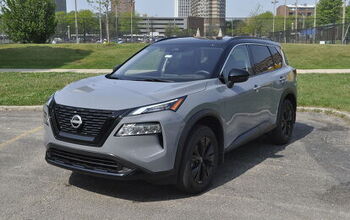EU Postpones Vote on Combustion-Engine Ban, Germany Asks for Favors

The European Union is reportedly finding itself in a difficult position ahead of prospective bans on vehicles utilizing internal combustion engines. Germany has threatened to block the agreement, pulling what can only be described as the classic switcheroo in exchange for favorable conditions.
German manufacturers are attempting to market synthetic fuels as a viable and environmentally sound alternative to standard gasoline or diesel. Regulators influenced by the automotive sector are now pressing for the EU to make special exceptions for so-called “electrofuels” before the combustion ban can be finalized – with Italy likewise suggesting it would reject the emission rules everyone agreed to last year.
According to Bloomberg, German Transport Minister Volker Wissing spoke with Frans Timmermans (the man heading the European Commission’s Green Deal and Climate Law) to discuss the proposal ahead of voting.
“If the Commission has a credible stance in conversations with the ministers and the German government I’m optimistic that a solution will be found,” said Sven Giegold, state secretary at Germany’s Federal Ministry for Economic Affairs and Climate Action. “However I can say, and that’s obvious, that the ongoing conversations are difficult.”
From Bloomberg:
The last-minute intervention by Germany’s transport ministry has thrown what would normally be a formality into disarray. Preparations for Tuesday’s vote were postponed until Friday due to Germany threatening to abstain and Italy saying they would reject the CO2 rules agreed last year. Without a qualified majority among member states, the regulation can’t become law.
There is widespread frustration in the European Commission that Germany is raising objections at this stage when it agreed on the council’s position last June. The home to Volkswagen AG and BMW AG took part in a final deal with the parliament in October and balking after a so-called trilogue agreement is highly unusual.
While Italy’s opposition is seen as stubborn, EU officials hope Germany can be persuaded to back down, if it gets assurances that the commission will propose an exemption for climate-neutral synthetic fuels before a scheduled review in 2026.
However, properly assessing whether these synthetic fuels are actually capable of becoming carbon neutral could take ages. Porsche and Siemens have been developing synthetic fuels at a plant in Chile and have suggested that they could reduce the CO2 emissions of internal combustion by around 85 percent. But that’s going to be impossible to prove before Friday’s vote and there have been a lot of allegations being thrown around that German automakers are only pushing “e-fuels” so they can continue selling combustion vehicles.
Though similar arguments could be made about battery electric vehicles, which don’t produce any emissions themselves but are plugged into electrical grids and global supply chains that emit a steady stream of pollution nobody seems interested in looking into. The shallow assumption that these vehicles lack exhaust systems appears to be good enough for most regulators taking the out-of-sight-out-of-mind approach.
Let’s also not forget how Europe’s sudden conviction that widespread diesel use would be better for the environment ended in total disaster. The region had actively been incentivizing “clean diesel” since the 1990s. But the bubble popped in 2015 when Volkswagen was busted for emissions cheating. In the end, it turned out that plenty of automakers were having trouble meeting regulatory targets and had to get creative to avoid government fines. Meanwhile, a second look at Europe’s air quality showed that encouraging everyone to drive diesel vehicles lowered CO2 levels while dramatically increasing particulate matter and NOX emissions.
Synthetic fuels may yield similar unpleasant surprises if embraced before being thoroughly examined.
At a minimum, we know they’ll be significantly more expensive than standard gasoline or diesel. Though costs are supposed to decline as production increases. There are even schemes to mix e-fuel into diesel and gasoline gradually through 2050, to help consumers avoid sticker shock and ensure older engines run into less trouble. But it still sounds like a massive gamble that really only benefits the companies producing synthetic fuels – which are primarily German at the moment – until there’s more hard data that synthetic fuels are truly workable and offer tangible ecological benefits.
German leadership is keen to support the automotive sector, as it represents 5 percent of the national economy. Unfortunately, that figure is poised to come down as widespread electrification requires fewer local suppliers and more battery components to be shipped in from Asia. In fact, Ford announced plans in February to cut about 3,800 jobs across Europe, with workers in Germany being among the hardest hit. Numerous unions (namely IG Metall) have already issued formal complaints to the German government about the employment perils posed by EVs and further economic strife has left political leaders wanting to appear committed to retaining jobs.
“Whoever is serious about climate-neutral mobility must keep all technological options open and also use them,” German Transport Minister Volker Wissing said in an interview with public broadcaster ARD. “I don’t understand this fight against the car and why people want to ban some technologies.”
Keep in mind that Germany was totally on board with widespread vehicle bans last June and allegedly sought no changes to regulations proposed by the European Commission.
[Image: Filmbildfabrik/Shutterstock]
Become a TTAC insider. Get the latest news, features, TTAC takes, and everything else that gets to the truth about cars first by subscribing to our newsletter.

A staunch consumer advocate tracking industry trends and regulation. Before joining TTAC, Matt spent a decade working for marketing and research firms based in NYC. Clients included several of the world’s largest automakers, global tire brands, and aftermarket part suppliers. Dissatisfied with the corporate world and resentful of having to wear suits everyday, he pivoted to writing about cars. Since then, that man has become an ardent supporter of the right-to-repair movement, been interviewed on the auto industry by national radio broadcasts, driven more rental cars than anyone ever should, participated in amateur rallying events, and received the requisite minimum training as sanctioned by the SCCA. Handy with a wrench, Matt grew up surrounded by Detroit auto workers and managed to get a pizza delivery job before he was legally eligible. He later found himself driving box trucks through Manhattan, guaranteeing future sympathy for actual truckers. He continues to conduct research pertaining to the automotive sector as an independent contractor and has since moved back to his native Michigan, closer to where the cars are born. A contrarian, Matt claims to prefer understeer — stating that front and all-wheel drive vehicles cater best to his driving style.
More by Matt Posky
Latest Car Reviews
Read moreLatest Product Reviews
Read moreRecent Comments
- Lorenzo The unspoken killer is that batteries can't be repaired after a fender-bender and the cars are totaled by insurance companies. Very quickly, insurance premiums will be bigger than the the monthly payment, killing all sales. People will be snapping up all the clunkers Tim Healey can find.
- Lorenzo Massachusetts - with the start/finish line at the tip of Cape Cod.
- RHD Welcome to TTAH/K, also known as TTAUC (The truth about used cars). There is a hell of a lot of interesting auto news that does not make it to this website.
- Jkross22 EV makers are hosed. How much bigger is the EV market right now than it already is? Tesla is holding all the cards... existing customer base, no dealers to contend with, largest EV fleet and the only one with a reliable (although more crowded) charging network when you're on the road. They're also the most agile with pricing. I have no idea what BMW, Audi, H/K and Merc are thinking and their sales reflect that. Tesla isn't for me, but I see the appeal. They are the EV for people who really just want a Tesla, which is most EV customers. Rivian and Polestar and Lucid are all in trouble. They'll likely have to be acquired to survive. They probably know it too.
- Lorenzo The Renaissance Center was spearheaded by Henry Ford II to revitalize the Detroit waterfront. The round towers were a huge mistake, with inefficient floorplans. The space is largely unusable, and rental agents were having trouble renting it out.GM didn't know that, or do research, when they bought it. They just wanted to steal thunder from Ford by making it their new headquarters. Since they now own it, GM will need to tear down the "silver silos" as un-rentable, and take a financial bath.Somewhere, the ghost of Alfred P. Sloan is weeping.

































Comments
Join the conversation
Y'all can argue about ICE vs EVs all you want to. When it comes to Big Oil, it needs Americans to operate. I'll be laughing my butt off when the Russians try to maintain there oil infrastructure without Americans around. Well, OK Brits too and our hockey loving neighbors to the north also. Oops forgot about the French and Algeria.
If you're gonna run a large oil project of any kind, you need someone raised in a country were British common law was the foundation of their judiciary.
Oil, one thing the English-speaking do really, really well.
And another minor inconvenience to EVs - from our friends at the NOT conservative news source - yahoo.com
https://autos.yahoo.com/charging-station-goes-boom-ev-151500807.html